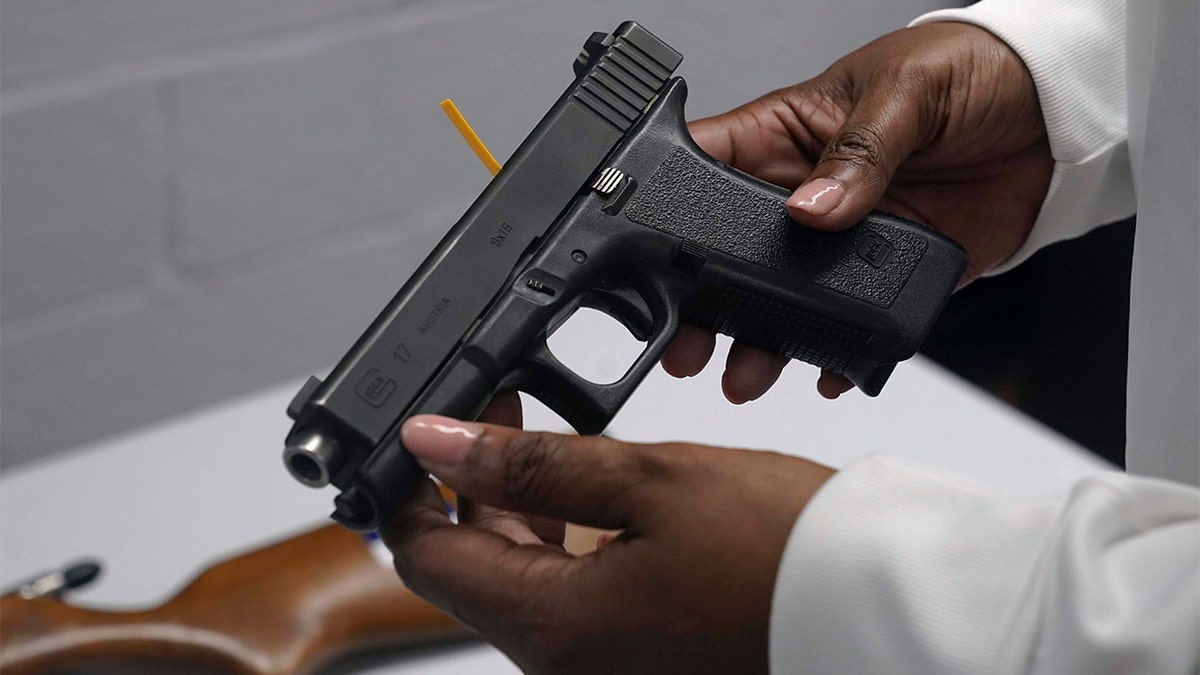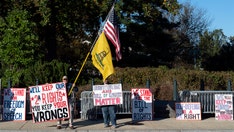Supreme Court rules in favor of gun owners in NY case
Constitutional law professor Jonathan Turley, Fox News host Shannon Bream and former assistant U.S. attorney Andy McCarthy discuss the details and implications of the 6-3 ruling.
The Supreme Court Thursday ruled 6-3 that New York’s regulations that made it difficult to obtain a license to carry a concealed handgun were unconstitutionally restrictive, and that it should be easier to obtain such a license.
The existing standard required an applicant to show "proper cause" for seeking a license, and allowed New York officials to exercise discretion in determining whether a person has shown a good enough reason for needing to carry a firearm. Stating that one wished to protect themselves or their property was not enough.
"In this case, petitioners and respondents agree that ordinary, law-abiding citizens have a similar right to carry handguns publicly for their self-defense. We too agree, and now hold, consistent with Heller and McDonald, that the Second and Fourteenth Amendments protect an individual’s right to carry a handgun for self-defense outside the home," Justice Clarence Thomas wrote in the Court's opinion, referencing two previous gun cases. "Because the State of New York issues public-carry licenses only when an applicant demonstrates a special need for self-defense, we conclude that the State’s licensing regime violates the Constitution."
Thomas noted that the state statute does not define what "proper cause" means, and that courts had ruled that the standard was met by people who showed a "special need for self-protection."

FILE - A handgun from a collection of illegal guns is reviewed during a gun buyback event in Brooklyn, N.Y., May 22, 2021. (AP Photo/Bebeto Matthews, FIle)
"This ‘special need’ standard is demanding," Thomas wrote. "For example, living or working in an area ‘noted for criminal activity’ does not suffice."
In 43 other states, Thomas noted, authorities are required to issue licenses to applicants who meet certain requirements, and officials do not have discretion to say no due to what they believe is an insufficient need.
In a concurring opinion, Justice Brett Kavanaugh noted that Thursday's ruling does not prohibit states from setting requirements to obtain a carry license, and that it "addresses only the unusual discretionary licensing regimes[.]"
The case, New York State Rifle & Pistol Association, Inc. v. Bruen, was the first major gun rights case before the Supreme Court in more than a decade. In the majority opinion, Thomas referenced 2010's McDonald v. City of Chicago and 2008's D.C. v. Heller in his reasoning for Thursday's ruling.
"As we stated in Heller and repeated in McDonald, ‘individual self-defense is ‘the central component’ of the Second Amendment right,’" the justice cited. He also referenced how Heller made clear that restrictions on carrying guns in "sensitive places" is permissible, and how New York was wrong for arguing that it's law was merely doing just that.
"[W]e do think respondents err in their attempt to characterize New York’s proper-cause requirement as a ‘sensitive-place’ law," Thomas wrote, explaining that New York viewed "sensitive places" as anywhere "where people typically congregate and where law-enforcement and other public-safety professionals are presumptively available."
This definition, Thomas said, is too broad.
"Put simply, there is no historical basis for New York to effectively declare the island of Manhattan a "sensitive place" simply because it is crowded and protected generally by the New York City Police Department," he wrote.
The conservative justice also looked at the plain language of the Second Amendment, which protects the right "to keep and bear arms." He described keeping and bearing as two separate things, noting that Heller defines "bear" as "to wear, bear, or carry." This implies public carrying, Thomas said, because someone would not generally wear their gun in a holster at home, but would "keep" it somewhere.
The 63-page opinion also explored historical restrictions on carrying handguns that New York relied on. Thomas explained why they do not justify a current restriction, noting how past regulations from centuries ago focused on "dangerous and unusual weapons," while handguns today are relatively commonplace. While the handgun may have been considering dangerous and unusual during colonial times, the opinion said, in modern times it is "the quintessential self-defense weapon."
SENATE VOTES TO ADVANCE BIPARTISAN GUN CONTROL LEGISLATION
The Court's opinion also stated that the Second Amendment right to keep and bear arms should not be held to a lower standard than other constitutional rights.
"We know of no other constitutional right that an individual may exercise only after demonstrating to government officers some special need. That is not how the First Amendment works when it comes to unpopular speech or the free exercise of religion. It is not how the Sixth Amendment works when it comes to a defendant’s right to confront the witnesses against him. And it is not how the Second Amendment works when it comes to public carry for self-defense," Thomas wrote.
Justice Stephen Breyer wrote an impassioned dissenting opinion in which he referenced present-day fervor over gun violence, as well as recent events. Joined by Justices Elena Kagan and Sonia Sotomayor, Breyer cited statistics including 45,222 Americans killed by firearms in the U.S. in 2020, the number of mass shootings that have already taken place in 2022, and how gun violence is now the leading cause of death for children and adolescents.
"Many States have tried to address some of the dangers of gun violence just described by passing laws that limit, in various ways, who may purchase, carry, or use firearms of different kinds," Breyer wrote. "The Court today severely burdens States’ efforts to do so."
Justice Samuel Alito, in a concurring opinion, took issue with Breyer's references to recent shootings.
"Does the dissent think that laws like New York’s prevent or deter such atrocities? Will a person bent on carrying out a mass shooting be stopped if he knows that it is illegal to carry a handgun outside the home?" Alito asked. "And how does the dissent account for the fact that one of the mass shootings near the top of its list took place in Buffalo? The New York law at issue in this case obviously did not stop that perpetrator."
CLICK HERE TO GET THE FOX NEWS APP
Breyer recognized legitimate purposes for guns, such as sport, self-defense, or types of employment like security guards, but he said it is the responsibility of elected officials to balance "these lawful uses against the dangers of firearms" when crafting legislation.
"That consideration counsels modesty and restraint on the part of judges when they interpret and apply the Second Amendment," he said.

















































